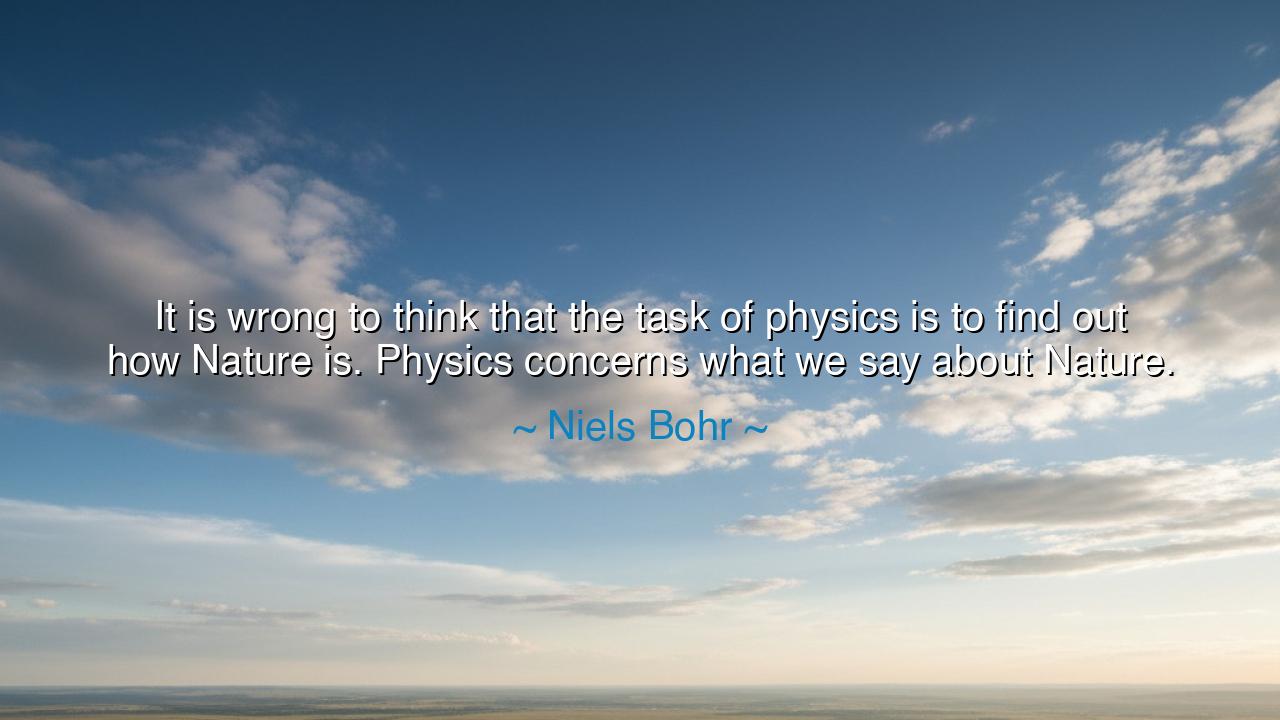
It is wrong to think that the task of physics is to find out how
It is wrong to think that the task of physics is to find out how Nature is. Physics concerns what we say about Nature.






Hearken, O seekers of knowledge and the mysteries of the cosmos, to the words of Niels Bohr, who proclaimed: “It is wrong to think that the task of physics is to find out how Nature is. Physics concerns what we say about Nature.” In these words lies a profound meditation upon the limits of human understanding, the art of description, and the humility required in the pursuit of wisdom. The ancients, who marveled at the stars and the order of the heavens, knew that the world itself is vast and inscrutable, and that the task of the philosopher is to interpret, to model, and to convey the patterns we perceive, not to claim mastery over the infinite.
Bohr’s insight emerges from the dawning of the modern era of quantum physics, where the behavior of atoms and subatomic particles defied classical notions of certainty and determinism. He recognized that the role of the physicist is not to penetrate Nature’s ultimate secrets in absolute terms, but to construct descriptions, predictions, and models that allow us to communicate and reason about observations. It is the distinction between the thing-in-itself and the map of the thing, a truth that the ancients understood in the allegories of Plato and the inquiries of Aristotle.
Consider the meaning of Bohr’s statement: to study Nature is not merely to catalog events, but to form statements, frameworks, and interpretations that make sense of those events within the bounds of human perception. In this lies both power and humility: power in the ability to predict and manipulate, humility in the recognition that our language, symbols, and measurements are not Nature itself, but mirrors reflecting aspects of its behavior. The physicist speaks, yet does not fully possess the infinite.
Historical parallels illuminate this wisdom. Galileo Galilei, observing the moons of Jupiter and the phases of Venus, did not claim that Nature’s essence was fully revealed. Instead, he offered descriptions, mathematical models, and reasoned arguments that communicated truths accessible to human understanding. Like Bohr, Galileo recognized that the act of scientific inquiry is a dialogue with the world, not its conquest. The language of physics becomes the instrument by which humans interpret the cosmos.
Bohr’s words also carry philosophical weight: they remind us that all knowledge is interpretive. Observation and measurement are acts of engagement, and the statements we make are constrained by the instruments, concepts, and categories through which we perceive reality. The ancients, from Pythagoras to the Stoics, taught that wisdom lies in recognizing the limits of human perception, and that insight is measured not only by clarity but by the humility with which it is offered.
The lesson here is profound: the pursuit of understanding requires both courage and restraint. To seek knowledge of Nature is to acknowledge its majesty and complexity while recognizing that our descriptions are provisional, symbolic, and human. We create maps to navigate the terrain of the unknown, but the terrain itself is greater than any map. Bohr’s insight reminds us to honor both the limits of comprehension and the power of reasoned articulation.
Practical guidance flows naturally from this meditation. In all endeavors of learning, whether scientific, artistic, or philosophical, attend carefully to the distinction between reality and representation. Speak and reason with clarity, but remain aware that your statements are tools, not the totality of truth. Cultivate humility alongside curiosity, acknowledging that observation and communication are our most potent instruments for engaging with the unknown.
Thus, O seeker, engrave this wisdom upon your spirit: the task of the scholar is not to command Nature, but to converse with it through observation, reason, and articulation. Physics, like all profound inquiry, is the art of expressing, describing, and predicting the workings of the world as they appear to us. In embracing this principle, one walks the path of insight tempered by humility, and of knowledge tempered by reverence for the infinite mystery of the cosmos.






AAdministratorAdministrator
Welcome, honored guests. Please leave a comment, we will respond soon